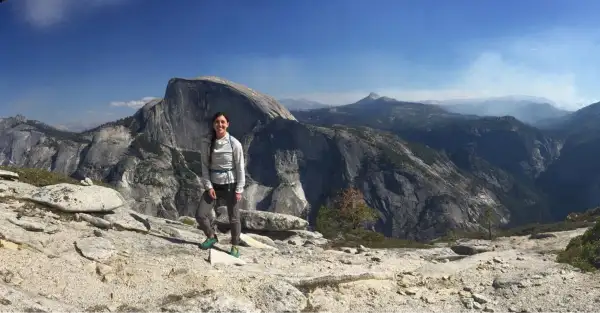Meet the 29-Year-Old Data Scientist Who Ditched Her Job to Become a Full-Time Rock Climber

Like most millennials, Lauren Ford counts housing as her biggest monthly expense. But her housing money goes straight into her gas tank.
That’s because Ford, 29, lives out of her 2003 Chevy Astro van, currently in Yosemite, Calif.
“It’s got my whole life in it,” she says.
No, Ford’s not down on her luck. Far from it: she’s living her dream. In August, she quit her job as a quantitative analyst for real estate firm Trulia and began rock climbing full-time.
She’s got enough money saved for at least six months of full-time climbing, maybe more. Here’s how this millennial made her dream a reality:
She Traded Rent for Gas
Ford grew up in the Bay Area and spent several years in San Francisco after graduating from college. She earned a good salary as a quantitative analyst but she also paid high, Bay Area rents.
In 2015, she moved to Truckee, California, near Lake Tahoe. She worked remotely for Trulia, still making her Silicon Valley salary but now paying just $650 a month to live in a 4-bedroom home with four roommates. She pocketed her savings and is now living off those funds. Her monthly expenses run about $1,500 for gas, groceries, campsite fees and gear purchases. The specialized climbing shoes she wears retail for about $185, and the metal stoppers that she puts into cracks in the rock cost about $75 each.
She Embraced the Analog
Ford quickly learned the cardinal rule for living in a tight space: keep only items that you use every day. While she has storage space underneath her mattress, there’s only room for essentials.
Ford ditched the cute outfits she brought when she realized she lived exclusively in her climbing clothes. Out went the extra spatula she packed: Ford needs just one to make the nutritious lentil meals that she cooks on the Coleman two-burner stove in the back of her van. One item she can’t live without: her bicycle, which is crucial for accessing hard-to-reach climbing locations and for bypassing car traffic in national parks.
Her entertainment is simple. The Internet connection where she spends most of her time isn’t strong enough for streaming Netflix or Spotify. (She can check email and keeps her laptop charged with a solar-powered adapter.) Most evenings she hangs out with fellow camping friends.
The extra effort that her lifestyle entails is more than worth it, Ford says: “Being able to go wherever I want, whenever I want, is amazing and the downsizing and minor frustrations are worth it to have that freedom.”
She's Not Freaking Her Family Out
Ford isn’t worried about taking a break from work. After all, as a data scientist she’s got one of the most in-demand skills in today’s economy. Not only that, but her job is one that can frequently be done remotely. If her savings run low, she could likely find a remote, part-time job that allows her to keep climbing.
While she’s no longer earning a paycheck, Ford’s not dipping into her 401(k) to fund her adventures. If she did that, she’d have to pay an early-withdrawal penalty to the Internal Revenue Service—not to mention that she’d be draining her future savings.
Unlike many full-time rock climbers, who enter the lifestyle just out of college, Ford established herself in her career before she started climbing. That’s one reason why her family was so supportive of her plans.
“My family was pretty excited about it,” Ford says. “They’re not freaked out that I’ll retire and live in a ditch.”
